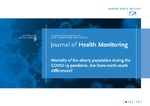Mortality of the elderly population during the COVID-19 pandemic. Are there north-south differences?
Nowossadeck, Enno
COVID-19 disease courses are dynamic and in some cases, fatal. In this article, we aim to identify the periods where
overall mortality is higher, and therefore to more precisely measure excess mortality. We analysed mortality rate development
for the population aged 65 years and older in Germany as a whole, a south Germany region (comprising the federal
states of Baden-Wuerttemberg and Bavaria) and a north Germany region (comprising the federal states of Schleswig
Holstein, Mecklenburg Western-Pomerania and Brandenburg). The article analyses the mortality rates per calendar week
that have been published by Germany’s Federal Statistical Office (Destatis) for the first 23 calendar weeks of 2020.
We compare these figures with those for the same period 2016, the last year in which there was no influenza-related
excess mortality. In calendar weeks ten to 15, mortality rates for the elder population rose exceptionally in the south
compared to the north Germany region as well as compared to the 2016 figures. A peak was reached in calendar weeks
14 and 15. Mortality rates peaked around two to three weeks after incidence. Since this peak, mortality rates have decreased
again, but up to calendar week 18 have remained above the 2016 rates. Overall the rise in mortality rates observed appears
to be related to the COVID-19 pandemic and not the annual influenza wave.
Dateien zu dieser Publikation
Keine Lizenzangabe

